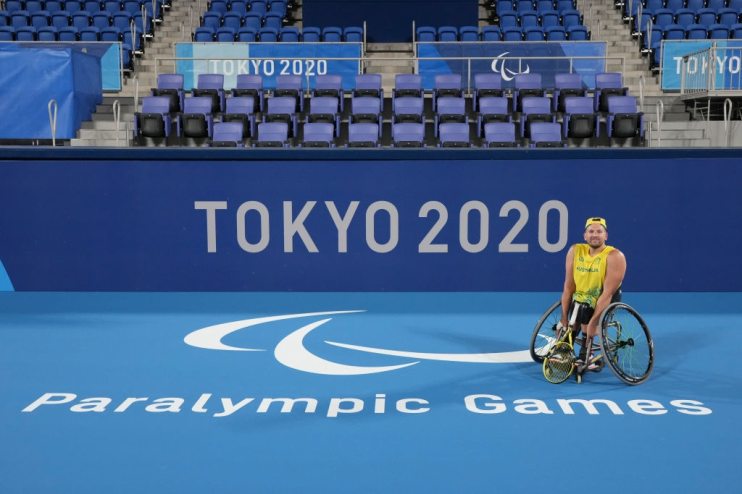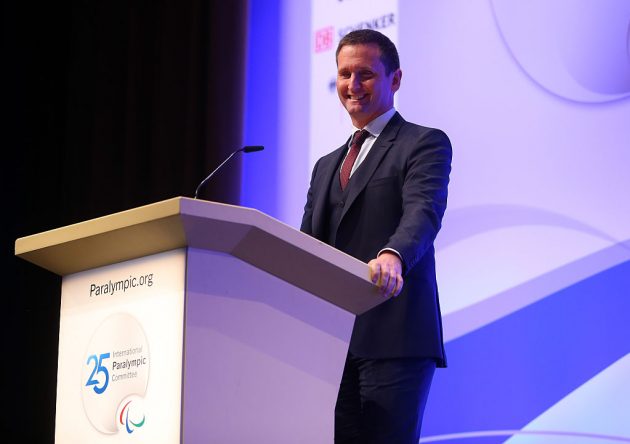Lord Chris Holmes: Five Paralympic Games that laid the path to Tokyo 2020

On the eve of the Tokyo 2020 Paralympic Games, I thought it an excellent opportunity to look back at five Games that have shaped the modern Paralympics – especially as it began in British.
Stoke Mandeville 1948
It was post-war Britain, London was hosting the first post-war Olympic Games at White City and, simultaneously, on the lawns in front of the spinal injuries unit at Stoke Mandeville, the Paralympics was being born.
How so? Why then? As is often the case, it was down to the vision, leadership and determination of one individual seeing the world differently: Stoke Mandeville neurologist Sir Ludwig Guttman, who established an archery competition between spinal injury patients.
While the first official Paralympic Games would not take place until 1960, that sunny afternoon at Stoke Mandeville was to be the forerunner.
Seoul searching
Seoul 1988 marked the first time that the Paralympics had taken place in the same city as the Olympics since Tokyo 1964.
In many ways it was the first modern Paralympic Games. It was also the first one at which I was fortunate enough to compete.
For the first time at a Paralympic Games, competition venues were packed and we competed in front of bumper crowds.
Organisers reasoned they had no chance of selling tickets for disability sports so invited local schoolchildren, churches and community groups to come along and be allocated a nation to get behind.
And they did. South Korean kids roared us home, lifting me and the entire team to the greatest performances of our lives. Seoul was a terrific Paralympic Games.
For the first time there was a little TV coverage, too. Yes, it was two months after we came home and, yes, it was just an hour but, crucially, it was a start.
Those early clips shown just before Christmas 1988 laid another important stone in the road to future Games.
Barcelona 1992
Barcelona was the first time Paralympians got to stay in the Olympic village. And what a village: if you have stayed in the city’s Arts Hotel you have visited it as well.
The stunning open-air pool bathed in Spanish sunshine was special, too.
But what made the Barcelona 1992 was that they were the people’s Paralympics.
The citizens of Barcelona came, spectated and became Paralympic fans. Tickets were free, but people still had to commit to coming and they did in their thousands.
Broadcasting also progressed, with live TV and radio interviews from poolside and action shown on that weekend’s BBC Grandstand.
Sydney 2000
Sydney 2000, my last Paralympics, was a very good Games. And they needed to be after the debacle of Atlanta 1996.
Operationally, everything worked, with great transport, village and competition venues. The pool was tremendous and was packed.
The Games had moved on again. There were crowds throughout the park and sports venues who had committed to and paid to be part of the Paralympics.
Sydney Paralympic Games – the first Paralympic Games to have a meaningful, and impressive, ticket sales programme.

British broadcasting had almost daily coverage of events and Paralympians were starting to become recognisable figures, such as Lee Pearson steering his horse to dressage glory and Noel Thatcher after his 5,000m victory on the track, to name just two.
Sydney 2000 took the Paralympic Games global – not universal, more nations were still to come, as were more broadcasters such as NBC, who would take another 16 years to get across the line – in feel, in outlook, in coverage and in the complete presentation of Paralympic sport.
And that closing ceremony: Kylie spinning around, athletes, Stadium Australia, Sydney showcasing the Paralympic world to a new place for the new millennium. A global place, a global Games, the first such Paralympics.
London 2012
What to say about a Games that achieved so much for so many by so many? I had long since retired from the pool, Speedos shrivelled, goggles gone.
But for London 2012 I had the unbelievable opportunity to lead the team that would plan and deliver the Paralympic Games: the first time the Games had been back in Britain since their incredible inception some 64 years earlier on the lawns of Stoke Mandeville.
How to put on a Paralympic Games that would reflect and respect all of that heritage; to credit that history while also being firmly rooted in the modern, in our city and our communities around the park and the venues?
London 2012 was the first ever Olympic Games and Paralympic Games to be planned in a fully integrated fashion. Right from the start line of the bid we talked about a unified bid. It seems simple but had never been done before.
I had so many hopes for the 2012 Games that I knew we could more than realise if we built the story, the vision, the mission and got everyone on it, and they did. They included:
- To sell all the tickets
- To have all Olympic sponsors also Paralympic sponsors
- To have major broadcast deals right around the world
Non had ever been done before, and I knew if we could do all this we could not just shift the dial but create a whole new Paralympic paradigm.
The London 2012 Paralympic Games was packed. Every ticket for every session sold, a ticket strategy with accessibility, affordability and revenue generation at its heart. There were no free tickets any more – this thing was valuable and worth paying to come and be part of.
Every Olympic sponsor signed up, activated and got fully involved. It was great for their brands and great for the Paralympic Games.
And that broadcast deal with Channel 4, who did it differently, grasped our vision and what we believed was possible for the Games, and partnered with us on that journey.
An unforgettable experience
The sport coverage was stunning. Who can forget Jonny Peacock, a teenager from the Midlands, standing to shush 80,000 fans at the start of his final, then racing to Paralympic gold?
Who can forget Ellie Simmonds and all the swimming medals at the pool, velodrome and Copper Box?
There were ground breaking shows such as The Last Leg and Channel 4’s famous Meet the Superhumans promo film.
The London 2012 Paralympic Games had the athletes at its heart. World class sport at world class venues. Spectated by almost 3m fans in person, millions more via the coverage on Channel 4 and hundreds of millions around the world, so many getting into Paralympic sport for the very first time.
More than that, though, walking through the Paralympic park at Games time it felt like the most inclusive environment ever created.
So, to Paralympics GB at Tokyo 2020, to all the teams – the stage is now yours, a unique Games in uniquely difficult circumstances but the mission and the medals remain the same. It’s your time.
Chris Holmes, Baron Holmes of Richmond MBE, is a former swimmer who won nine gold medals at the Paralympic Games and was Director for Paralympic Integration at the London 2021 Olympics.